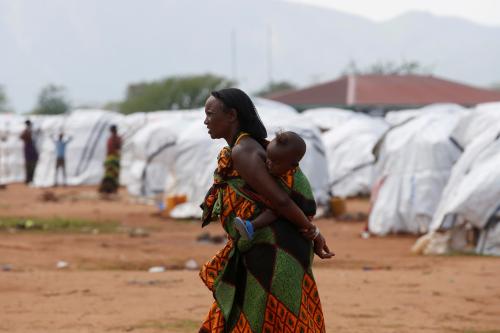Below is a viewpoint from Chapter 4 of the Foresight Africa 2019 report, which explores six overarching themes on the triumphs of the past years as well as strategies to tackle the remaining obstacles for Africa. Read the full chapter on fixing fragility.
Africa is one the most vulnerable regions to natural disasters and the impact of climate change despite contributing the least to global warming. Africa faces major hurdles, including fiscal constraints and lack of appropriate policy and institutional framework, to prepare for, manage, and respond to disaster risks that are increasing because of climate change. For example, the agriculture system on the continent, mostly rain-fed, is likely to suffer from a reduction in crop yields, which will increase rural-to-urban migration. As a result, more than 85 million people (4 percent of the overall population) are estimated to have to relocate within their own countries by 2050. This internal movement could exacerbate the impact of events like disease outbreak, flooding, and food price hikes.
In response, the African Union established the African Risk Capacity (ARC) in 2012 to provide African sovereigns with capacity-building, technical, and institutional support for early warning, contingency planning and management, and risk finance. The agency enables governments to build resilience and better plan, prepare for, and respond to extreme weather events such as drought. ARC Insurance Company Limited (ARC Ltd.)—a specialist hybrid mutual insurance company established as an affiliate to the agency in late 2014—transfers weather risk away from governments, and the vulnerable households they protect, to ARC Ltd.
The early response interventions in the critical three months after harvest, one of the key value propositions of ARC, could result in economic gains of over $1,200 per household assisted.
From 2014 to date, ARC has provided support to more than 16 out the 34 African countries that have signed the ARC treaty. ARC and its insurance affiliate have underwritten over $400 million of drought insurance policies and provided indirect insurance coverage to more than 9.7 million Africans. So far, the sovereign pool insurance has disbursed cumulatively $36.8 million in payout to drought-affected countries in Africa, used for rapid response and assistance to over 2.1 million vulnerable people and over 1 million livestock. Governments of ARC Member States have used ARC funding to scale up cash transfers, subsidize livestock feed, replenish depleted food reserves, and distribute emergency food supplies.
While risk transfer mechanisms such as ARC insurance are appropriate for low frequency and high impact disasters, they are less effective as instruments to respond to frequent disasters. Thus, it is paramount for African governments, policymakers, and partners to develop various but complementary instruments to protect from disaster events of various frequency and severity. Layering these risks and identifying the appropriate mechanisms (risk retention versus risk transfer) along with an adequate investment in disaster risk reduction measures and preparedness will provide more comprehensive protection to the African countries. This is the aim of ARC.
The Brookings Institution is committed to quality, independence, and impact.
We are supported by a diverse array of funders. In line with our values and policies, each Brookings publication represents the sole views of its author(s).








Commentary
An African-owned initiative to manage natural disaster and climate risks
March 14, 2019